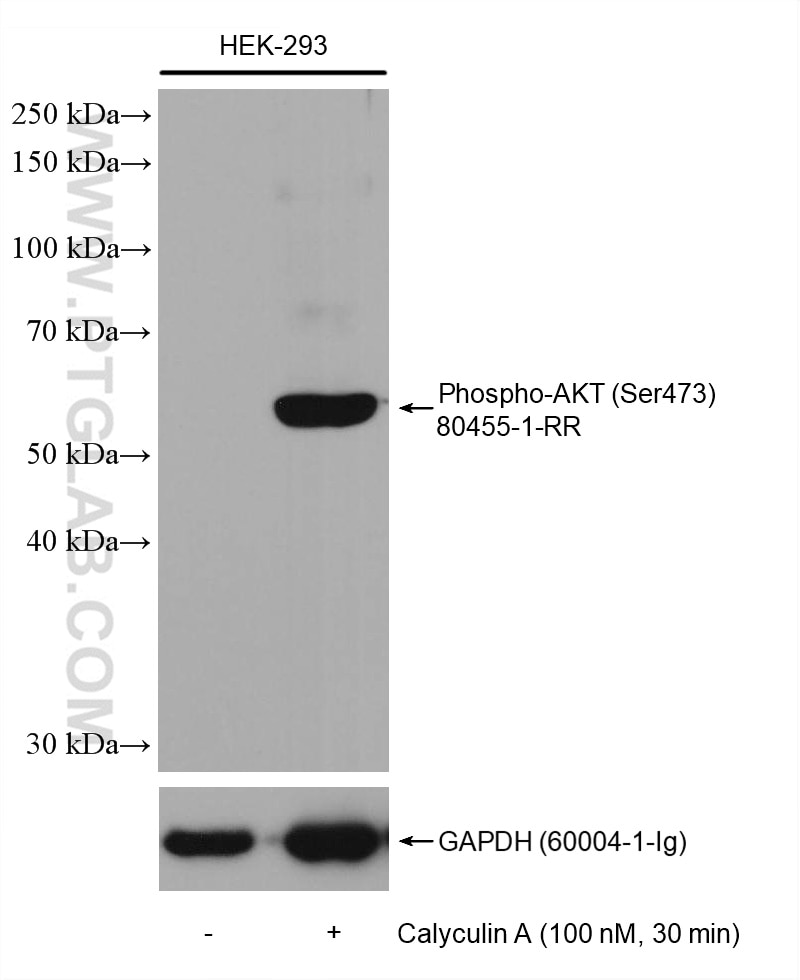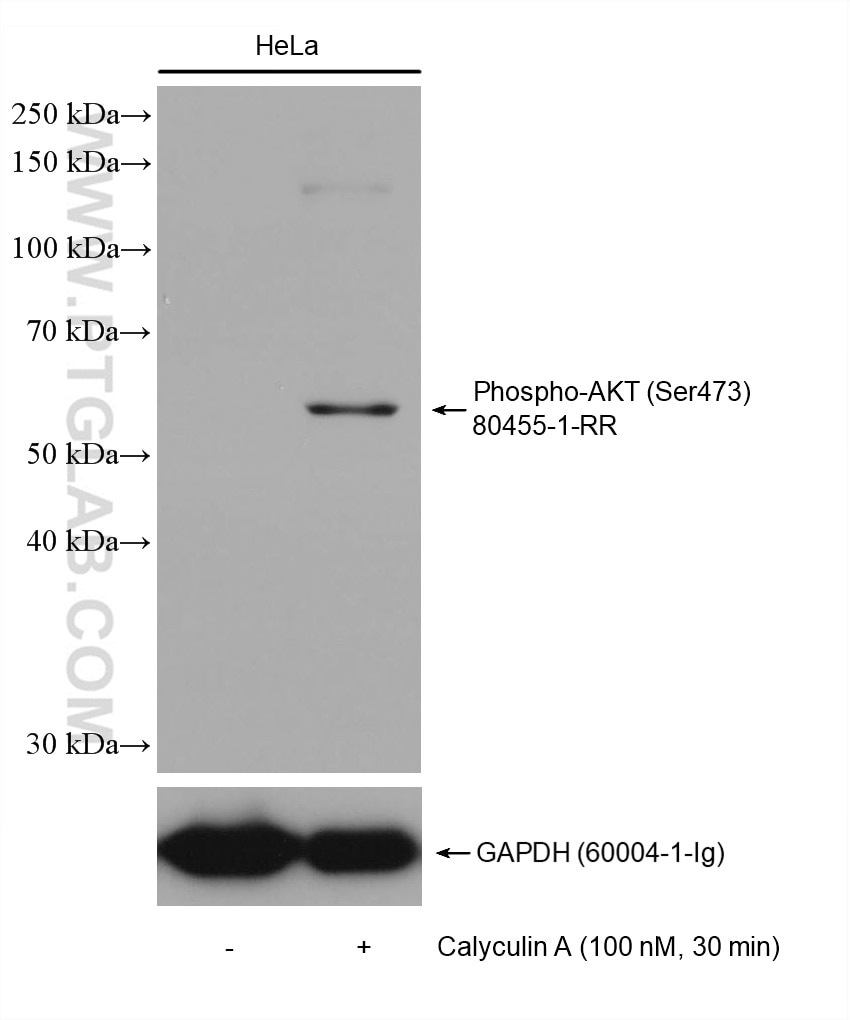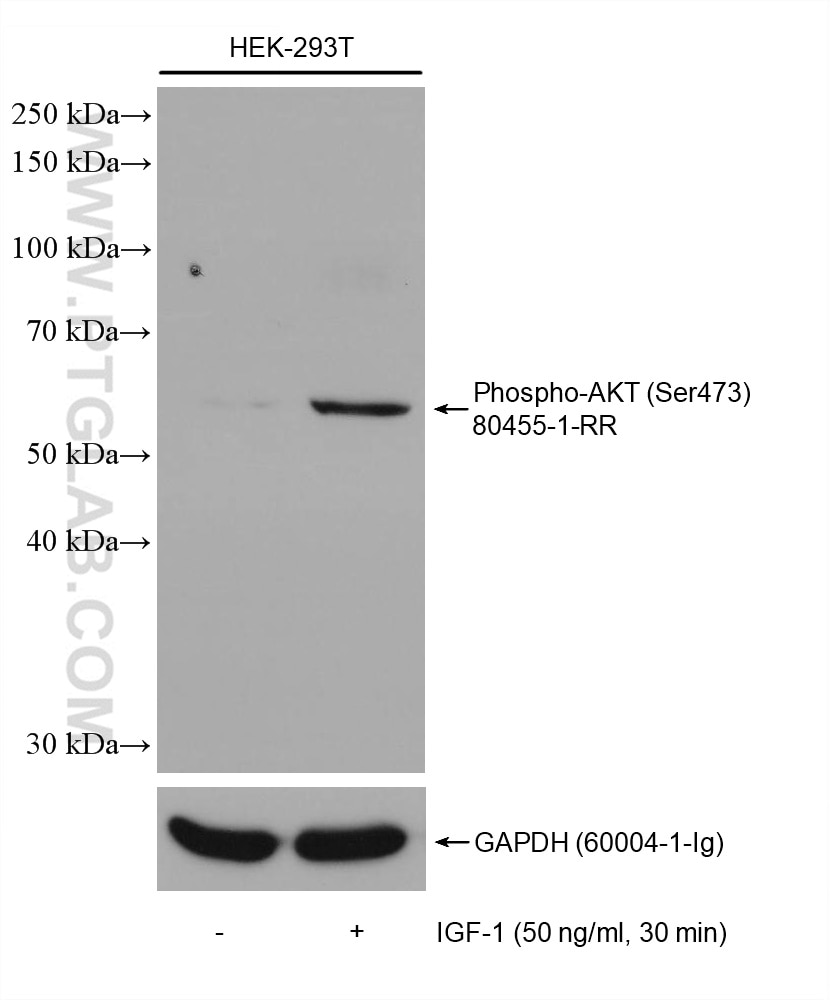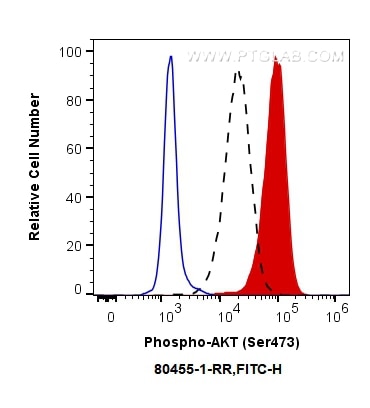Anticorps Recombinant de lapin anti-Phospho-AKT (Ser473)
Phospho-AKT (Ser473) Recombinant Antibody for FC, WB, ELISA
Hôte / Isotype
Lapin / IgG
Réactivité testée
Humain et plus (2)
Applications
WB, IHC, IF, FC, ELISA
Conjugaison
Non conjugué
CloneNo.
2E17
N° de cat : 80455-1-RR
Synonymes
Galerie de données de validation
Applications testées
| Résultats positifs en WB | cellules HEK-293, cellules HEK-293 traitées à la calyculine A, cellules HEK-293T, cellules HEK-293T traitées à l'IGF-1, cellules HeLa, cellules HeLa traitées à la calyculine A |
| Résultats positifs en cytométrie | cellules HEK-293 traitées à la calyculine A, |
Dilution recommandée
| Application | Dilution |
|---|---|
| Western Blot (WB) | WB : 1:5000-1:50000 |
| Flow Cytometry (FC) | FC : 0.25 ug per 10^6 cells in a 100 µl suspension |
| It is recommended that this reagent should be titrated in each testing system to obtain optimal results. | |
| Sample-dependent, check data in validation data gallery | |
Applications publiées
| WB | See 46 publications below |
| IHC | See 1 publications below |
| IF | See 1 publications below |
Informations sur le produit
80455-1-RR cible Phospho-AKT (Ser473) dans les applications de WB, IHC, IF, FC, ELISA et montre une réactivité avec des échantillons Humain
| Réactivité | Humain |
| Réactivité citée | rat, Humain, souris |
| Hôte / Isotype | Lapin / IgG |
| Clonalité | Recombinant |
| Type | Anticorps |
| Immunogène | Peptide |
| Nom complet | v-akt murine thymoma viral oncogene homolog 1 |
| Poids moléculaire observé | 58 kDa |
| Numéro d’acquisition GenBank | NM_005163 |
| Symbole du gène | AKT1 |
| Identification du gène (NCBI) | 207 |
| Conjugaison | Non conjugué |
| Forme | Liquide |
| Méthode de purification | Purification par protéine A |
| Tampon de stockage | PBS avec azoture de sodium à 0,02 % et glycérol à 50 % pH 7,3 |
| Conditions de stockage | Stocker à -20°C. Stable pendant un an après l'expédition. L'aliquotage n'est pas nécessaire pour le stockage à -20oC Les 20ul contiennent 0,1% de BSA. |
Informations générales
AKT is a serine/threonine kinase and it participates in the key role of the PI3K signaling pathway. Phosphatidylinositol-3 kinase (PI3K) is the key regulator of AKT activation. The recruitment of inactive AKT protein to PIP3-rich areas of the plasma membrane results in a conformational change that exposes the activation loop of AKT. AKT's activating kinase, phosphoinositide-dependent protein kinase (PDK1) , is also recruited to PIP3 microdomains. PDK1 phosphorylates AKT on threonine 308 (Thr308) of the exposed activation loop, activating AKT and leading to a second phosphorylation of AKT at serine 473 (Ser473) by a kinase presumed to be mTORC2 that further potentiates kinase activity. Active AKT will phosphorylate various downstream protein targets that control cell growth and translational control and act to suppress apoptosis. (PMID: 31594388, PMID: 30808672)
Protocole
| Product Specific Protocols | |
|---|---|
| WB protocol for Phospho-AKT (Ser473) antibody 80455-1-RR | Download protocol |
| Standard Protocols | |
|---|---|
| Click here to view our Standard Protocols |
Publications
| Species | Application | Title |
|---|---|---|
Adv Healthc Mater A ROS-Responsive Liposomal Composite Hydrogel Integrating Improved Mitochondrial Function and Pro-Angiogenesis for Efficient Treatment of Myocardial Infarction. | ||
Research (Wash D C) Herpetrione, a New Type of PPARα Ligand as a Therapeutic Strategy Against Nonalcoholic Steatohepatitis | ||
Arch Pharm Res Selumetinib overcomes gefitinib primary and acquired resistance by regulating MIG6/STAT3 in NSCLC | ||
iScience WIPF1 promotes gastric cancer progression by regulating PI3K/Akt signaling in a myocardin-dependent manner | ||
Int J Mol Sci Identification of Potential Mechanisms of Rk1 Combination with Rg5 in the Treatment of Type II Diabetes Mellitus by Integrating Network Pharmacology and Experimental Validation | ||
J Cell Mol Med Irreversible repolarization of tumour-associated macrophages by low-Pi stress inhibits the progression of hepatocellular carcinoma |





